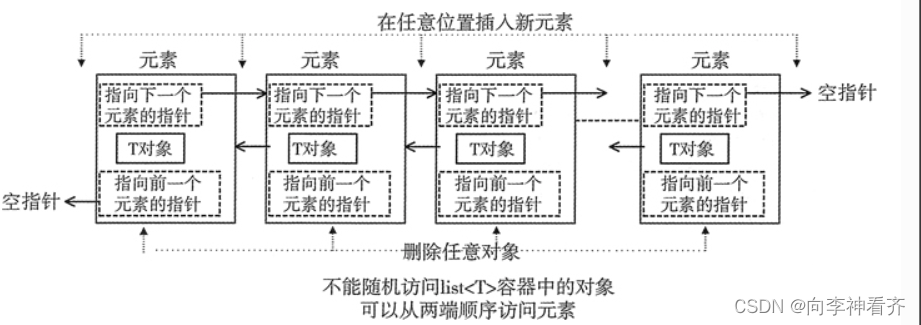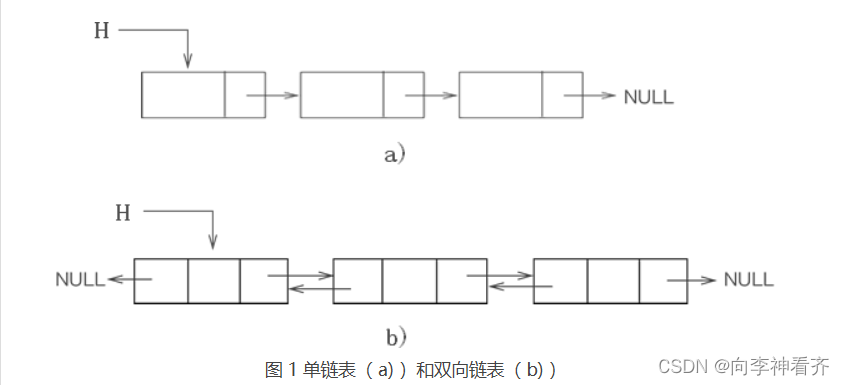1. list的介绍及使用
1. list是可以在常数范围内在任意位置进行插入和删除的序列式容器,并且该容器可以前后双向迭代。
2. list的底层是双向链表结构,双向链表中每个元素存储在互不相关的独立节点中,在节点中通过指针指向其前一个元素和后一个元素。

3. list与forward_list非常相似:最主要的不同在于forward_list是单链表,只能朝前迭代,已让其更简单高效。

4. 与其他的序列式容器相比(array,vector,deque),list通常在任意位置进行插入、移除元素的执行效率更好。
5. 与其他序列式容器相比,list和forward_list最大的缺陷是不支持任意位置的随机访问,比如:要访问list的第6个元素,必须从已知的位置(比如头部或者尾部)迭代到该位置,在这段位置上迭代需要线性的时间开销;list还需要一些额外的空间,以保存每个节点的相关联信息(对于存储类型较小元素的大list来说这可能是一个重要的因素)
2 list的使用
2.1 list的构造

有以下 5 种创建 list 容器的方式供选择。
1) 创建一个没有任何元素的空 list 容器:
std::list<int> values;2) 创建一个包含 n 个元素的 list 容器:
std::list<int> values(10);3) 创建一个包含 n 个元素的 list 容器,并为每个元素指定初始值。例如:
std::list<int> values(10, 5);4) 在已有 list 容器的情况下,通过拷贝该容器可以创建新的 list 容器。例如:
std::list<int> value1(10); std::list<int> value2(value1);5) 通过拷贝其他类型容器(或者普通数组)中指定区域内的元素,可以创建新的 list 容器。例如:
//拷贝普通数组,创建list容器 int a[] = { 1,2,3,4,5 }; std::list<int> values(a, a+5); //拷贝其它类型的容器,创建 list 容器 std::array<int, 5>arr{ 11,12,13,14,15 }; std::list<int>values(arr.begin()+2, arr.end());//拷贝arr容器中的{13,14,15}
2.2 list iterator的使用
下面这个程序演示了如何使用迭代器遍历 list 容器中的各个元素。
#include <iostream>
#include <list>
using namespace std;
int main()
{
//创建 list 容器
std::list<char> values{'h','t','t','p',':','/','/','c','.','b','i','a','n','c','h','e','n','g','.','n','e','t'};
//使用begin()/end()迭代器函数对输出list容器中的元素
for (std::list<char>::iterator it = values.begin(); it != values.end(); ++it) {
std::cout << *it;
}
cout << endl;
//使用 rbegin()/rend()迭代器函数输出 lsit 容器中的元素
for (std::list<char>::reverse_iterator it = values.rbegin(); it != values.rend();++it) {
std::cout << *it;
}
return 0;
}tips:迭代器失效即迭代器所指向的节点的无效,即该节点被删除了。因为list的底层结构为带头结点的双向循环链表,因此在list中进行插入时是不会导致list的迭代器失效的,只有在删除时才会失效,并且失效的只是指向被删除节点的迭代器,其他迭代器不会受到影响。
3.list的模拟实现
namespace lhh
{
template<class T>
struct list_node
{
T _data;
list_node<T>* _next;
list_node<T>* _prev;
list_node(const T& x = T())
:_data(x)
,_next(nullptr)
,_prev(nullptr)
{}
};
// T T& T*
// T cosnt T& const T*
template<class T, class Ref, class Ptr>
struct __list_iterator
{
typedef list_node<T> Node;
typedef __list_iterator<T, Ref, Ptr> self;
Node* _node;
__list_iterator(Node* node)
:_node(node)
{}
self& operator++()
{
_node = _node->_next;
return *this;
}
self& operator--()
{
_node = _node->_prev;
return *this;
}
self operator++(int)
{
self tmp(*this);
_node = _node->_next;
return tmp;
}
self operator--(int)
{
self tmp(*this);
_node = _node->_prev;
return tmp;
}
Ref operator*()
{
return _node->_data;
}
Ptr operator->()
{
return &_node->_data;
}
bool operator!=(const self& s)
{
return _node != s._node;
}
bool operator==(const self& s)
{
return _node == s._node;
}
};
//template<class T>
//struct __list_const_iterator
//{
// typedef list_node<T> Node;
// typedef __list_const_iterator<T> self;
// Node* _node;
// __list_const_iterator(Node* node)
// :_node(node)
// {}
// self& operator++()
// {
// _node = _node->_next;
// return *this;
// }
// self& operator--()
// {
// _node = _node->_prev;
// return *this;
// }
// self operator++(int)
// {
// self tmp(*this);
// _node = _node->_next;
// return tmp;
// }
// self operator--(int)
// {
// self tmp(*this);
// _node = _node->_prev;
// return tmp;
// }
// // *it = 10
// const T& operator*()
// {
// return _node->_data;
// }
// // it->a1 = 10
// const T* operator->()
// {
// return &_node->_data;
// }
// bool operator!=(const self& s)
// {
// return _node != s._node;
// }
// bool operator==(const self& s)
// {
// return _node == s._node;
// }
//};
template<class T>
class list
{
typedef list_node<T> Node;
public:
typedef __list_iterator<T, T&, T*> iterator;
typedef __list_iterator<T, const T&, const T*> const_iterator;
//typedef __list_const_iterator<T> const_iterator;
const_iterator begin() const
{
return const_iterator(_head->_next);
}
const_iterator end() const
{
return const_iterator(_head);
}
iterator begin()
{
//return iterator(_head->_next);
return _head->_next;
}
iterator end()
{
//return iterator(_head->_next);
return _head;
}
void empty_init()
{
_head = new Node;
_head->_next = _head;
_head->_prev = _head;
_size = 0;
}
list()
{
empty_init();
}
// lt2(lt1)
list(const list<T>& lt)
{
empty_init();
for (auto e : lt)
{
push_back(e);
}
}
// lt3 = lt1
/*list<int>& operator=(const list<int>& lt)
{
if (this != <)
{
clear();
for (auto e : lt)
{
push_back(e);
}
}
return *this;
}*/
void swap(list<T>& lt)
{
std::swap(_head, lt._head);
std::swap(_size, lt._size);
}
// lt3 = lt1
list<int>& operator=(list<int> lt)
{
swap(lt);
return *this;
}
~list()
{
clear();
delete _head;
_head = nullptr;
}
void clear()
{
iterator it = begin();
while (it != end())
{
it = erase(it);
}
}
void push_back(const T& x)
{
insert(end(), x);
}
void push_front(const T& x)
{
insert(begin(), x);
}
void pop_front()
{
erase(begin());
}
void pop_back()
{
erase(--end());
}
iterator insert(iterator pos, const T& x)
{
Node* cur = pos._node;
Node* newnode = new Node(x);
Node* prev = cur->_prev;
// prev newnode cur
prev->_next = newnode;
newnode->_prev = prev;
newnode->_next = cur;
cur->_prev = newnode;
++_size;
return iterator(newnode);
}
iterator erase(iterator pos)
{
Node* cur = pos._node;
Node* prev = cur->_prev;
Node* next = cur->_next;
delete cur;
prev->_next = next;
next->_prev = prev;
--_size;
return iterator(next);
}
size_t size()
{
return _size;
}
private:
Node* _head;
size_t _size;
};
}





















 614
614











 被折叠的 条评论
为什么被折叠?
被折叠的 条评论
为什么被折叠?








